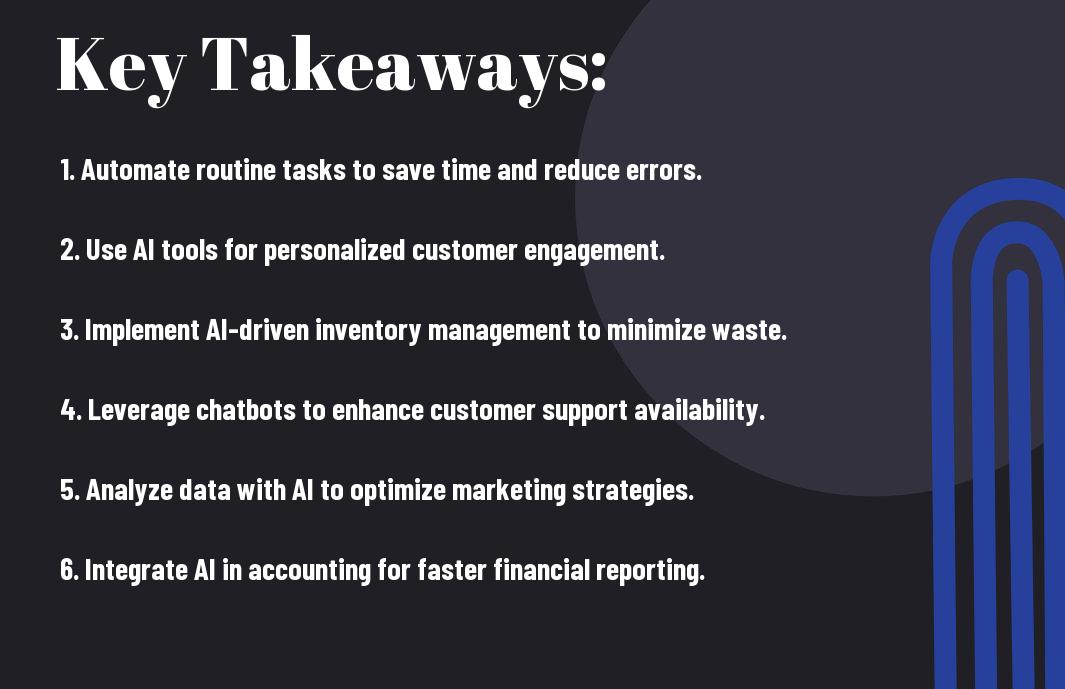Many small business owners are seeking ways to reduce operational costs while increasing productivity. In 2025, leveraging AI technology offers you powerful tools to streamline processes, enhance decision-making, and optimize resource management. By understanding how to implement AI-driven solutions, you can transform your business strategies and propel your company towards outstanding growth. This blog post will guide you through effective AI applications designed specifically for small businesses aiming to thrive in an increasingly competitive market.
Key Takeaways:
- Leverage AI tools for automating routine tasks, which can lead to significant cost savings and allow employees to focus on higher-value activities.
- Implement data analytics powered by AI to gain insights into customer behavior, enabling tailored marketing strategies and improved customer service.
- Utilize AI-driven solutions for inventory management and supply chain optimization, helping small businesses reduce waste and manage resources more effectively.

Understanding AI and Its Role in Small Business
To effectively navigate the future landscape of business, understanding artificial intelligence (AI) and its implications for small businesses is important. By integrating AI technologies into your operations, you can streamline processes, optimize resource allocation, and enhance customer interactions. This chapter will explore the various dimensions of AI that can significantly impact your business now and in the coming years.
Defining AI Technologies
On a foundational level, AI technologies encompass a range of tools and systems designed to simulate human intelligence. This can include machine learning algorithms, natural language processing, and automated systems that analyze vast datasets. By leveraging these technologies, you can make informed decisions and improve the efficiency of your business processes.
The Impact of AI on Business Operations
Above all, AI has the potential to transform your business operations by enhancing efficiency and reducing costs. By automating routine tasks and providing data-driven insights, AI allows you to allocate resources more effectively and focus on strategic initiatives.
The integration of AI into your business operations can yield significant benefits, such as time savings and cost reduction. AI tools can automate repetitive tasks, which not only frees up your workforce to concentrate on higher-value activities but also minimizes human error. Furthermore, AI-driven analytics can help you identify patterns and trends, facilitating better decision-making. However, it’s important to be aware of potential challenges such as data privacy concerns and the cost of implementation. Balancing these factors will be key in harnessing AI’s full potential for your business.
Cost-Cutting Strategies through AI
Even small businesses can harness the power of AI to discover innovative cost-cutting strategies. By implementing AI solutions, you can reduce unnecessary expenses while significantly improving efficiency. These technologies allow you to optimize operations, enhance decision-making, and streamline workflows, enabling your business to thrive in a competitive landscape without compromising quality.
Automating Routine Tasks
Below are examples of how automating routine tasks can free up valuable time and resources in your business. Simple processes like scheduling, data entry, and customer support can be handled by AI-powered tools, allowing you to focus on higher-value activities. This not only reduces labor costs but also minimizes human error, enhancing overall productivity.
Streamlining Supply Chain Management
Chain management is important in maintaining efficiency and cost-effectiveness in your operations. AI can help you analyze demand patterns, predict supply chain disruptions, and optimize inventory levels to ensure you have the right products available at the right time.
Strategies for streamlining your supply chain through AI can include demand forecasting and automated inventory management. By leveraging AI algorithms, you can analyze vast amounts of data to identify trends and account for variables that affect your supply chain. Implementing AI-driven solutions can significantly reduce operational costs, enhance delivery efficiency, and mitigate risks associated with stock shortages or overages. The adoption of these technologies empowers you to make informed decisions, ensuring your business remains agile and responsive to market needs.

Boosting Productivity with AI Tools
Despite the challenges that small businesses face, integrating AI tools can significantly enhance productivity. By automating repetitive tasks, these technologies free up valuable time for you and your team to focus on more strategic activities. From project management software to AI-powered scheduling, the right tools can optimize workflows, reduce human errors, and allow for smarter decision-making, ultimately driving your growth forward.
Enhancing Customer Service with Chatbots
With the implementation of chatbots, you can provide round-the-clock customer support, instantly addressing inquiries and resolving issues. This not only enhances customer satisfaction but also allows your team to concentrate on more complex tasks, ensuring efficient service delivery without the need for constant human oversight.
Utilizing AI for Data Analysis and Insights
By harnessing AI for data analysis, you can uncover valuable insights that would typically require extensive manual effort. These tools help you sift through vast amounts of data quickly, highlighting trends and patterns that can inform your business strategies.
Data analysis through AI provides you with the ability to make more informed decisions based on real-time insights. With enhanced accuracy in identifying trends, you can pivot your marketing efforts effectively and maximize your ROI. Furthermore, AI can help analyze customer behavior, allowing you to tailor your offerings to meet their preferences. However, it’s necessary to ensure that you protect customer information, as data breaches can lead to severe consequences. By utilizing AI responsibly, you can transform data into a powerful asset for your small business.
Case Studies of AI Implementation in Small Businesses
Now, you can draw inspiration from notable examples of small businesses leveraging AI for impressive results:
- Retail Company: Implemented AI chatbot, reducing customer service costs by 30% and increasing sales by 25%.
- Manufacturing Firm: Adopted AI-driven predictive maintenance, resulting in a 20% decrease in downtime and savings of $150,000 annually.
- Local Restaurant: Used AI for inventory management, leading to 15% cost savings and 10% more efficient stock control.
- Online Service Provider: Implemented AI analytics, boosting productivity by 40% through enhanced operational insights.
Success Stories
Case studies illustrate that businesses like a local bakery increased their output by 50% simply by using AI tools for demand forecasting, allowing them to optimize their production cycle.
Lessons Learned from Failures
At times, AI implementation does not go as planned. Small businesses may invest without a clear strategy, leading to wasted resources and minimal gains. One such case involved a media company that integrated AI for content generation without proper oversight, resulting in a 70% failure rate in produced articles.
This experience highlights the importance of implementing AI with a clear vision and thorough training. Engaging the right support and ensuring alignment of expectations can prevent overwhelming setbacks. Evaluate your current processes clearly before integrating AI, as a lack of research and misalignment with operational goals can lead to significant financial losses and decreased morale among your team. Always set clear, attainable objectives to gauge your progress effectively.
Future Trends in AI for Small Businesses
All small businesses should stay informed about the rapidly evolving landscape of AI technologies. In 2025, expect advancements in machine learning, natural language processing, and automation tools that will offer you innovative ways to improve operations and customer engagement. Leveraging these trends can give you a significant competitive edge, enabling you to enhance your efficiency and reduce costs.
Emerging Technologies to Watch
After evaluating the latest developments, you should keep an eye on AI-driven analytics platforms and smart automation solutions. These technologies promise to streamline workflows, allowing you to make data-driven decisions quickly. Furthermore, enhanced robotics and AI chatbots will enable you to provide personalized customer experiences, setting your business apart from the competition.
Preparing for an AI-Driven Market
At this juncture, it’s vital for you to adapt your business models to embrace AI technologies. Incorporating AI into your operations not only enhances productivity but also helps you stay competitive as the market evolves. You should invest in training your workforce to leverage these tools effectively, ensuring your team is equipped to maximize the benefits AI has to offer.
Due to the potential of AI to transform various aspects of your business, you must approach this transition with a robust strategy. Consider investing in software and tools that enable seamless integration of AI into your daily operations. Offering training programs for your employees will empower them to utilize these technologies effectively. Furthermore, establishing a continuous feedback loop is vital for understanding how AI impacts your operations, allowing you to refine processes and enhance productivity continually. Embracing these adjustments will position you to thrive in an increasingly AI-driven market.
Overcoming Challenges in Adopting AI
For small businesses, integrating AI can seem daunting, but by addressing potential hurdles head-on, you can pave the way for effective implementation. From budgeting constraints to training employees, recognizing these challenges enables you to formulate tailored solutions that align with your business goals.
Common Barriers for Small Businesses
To successfully adopt AI, you must first understand the common barriers hindering its implementation. Issues such as limited financial resources, lack of technical expertise, and employee resistance to change can all impede your progress, making it vital to identify these factors early on.
Strategies to Ensure Successful Integration
Successful integration of AI into your business requires a clear strategy that addresses technical and human components. Start by investing in proper training for your employees to foster a culture of innovation and adaptability. Additionally, partnering with AI-focused consultants can provide valuable insights tailored to your industry, ensuring that the technology aligns with your operational needs.
For instance, you could implement a phased approach, starting with pilot projects to test AI solutions without overwhelming your team. This strategy allows you to gather feedback, analyze outcomes, and make necessary adjustments before a full-scale deployment. By fostering open communication with your employees throughout the process, you can alleviate concerns and promote a sense of ownership, which is key to achieving a seamless transition.

Conclusion
As a reminder, leveraging AI in your small business can significantly enhance efficiency and reduce costs by 2025. By adopting AI tools, you can streamline operational processes, improve customer interactions, and boost overall productivity. Your ability to adapt to these innovative technologies will determine your competitive edge in the market. For a deeper understanding of how AI can transform your operations, check out Empowering Small Businesses: The Impact of AI on …, and start maximizing your potential today.
Q: How can AI help small businesses reduce operational costs?
A: AI can help small businesses streamline their operations through automation of repetitive tasks, optimization of workflows, and better data analysis. By implementing AI-driven tools, companies can reduce the time and resources spent on manual processes, such as data entry and customer support. Additionally, AI algorithms can analyze spending patterns and suggest cost-saving measures, enabling businesses to allocate their budgets more effectively. Over time, these changes can lead to significant reductions in overhead costs and improved financial health.
Q: What are some practical AI tools that small businesses can use to boost productivity?
A: There are numerous AI tools available that can enhance productivity for small businesses. Some popular options include customer relationship management (CRM) software with AI capabilities, such as Salesforce or HubSpot, which can help businesses manage customer interactions and sales pipelines more efficiently. Additionally, task automation tools like Zapier or Monday.com can help teams streamline workflows. AI-powered email management systems, such as Google’s Smart Compose, can save time in communication. These tools allow small businesses to focus more on strategy and growth rather than on time-consuming tasks.
Q: What considerations should small businesses keep in mind when adopting AI technologies?
A: When adopting AI technologies, small businesses should first evaluate their specific needs and challenges to select the right tools that align with their goals. It’s important to consider the ease of integration with existing systems and the level of technical support provided by the AI vendor. Training employees to effectively use these new tools is crucial for maximizing their benefits. Moreover, businesses should remain aware of data privacy and security regulations to ensure compliance while utilizing AI solutions. Taking a measured approach will help ensure that AI investments deliver the desired outcomes.


